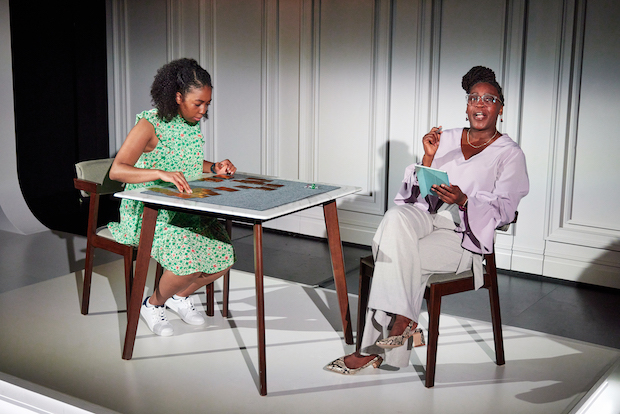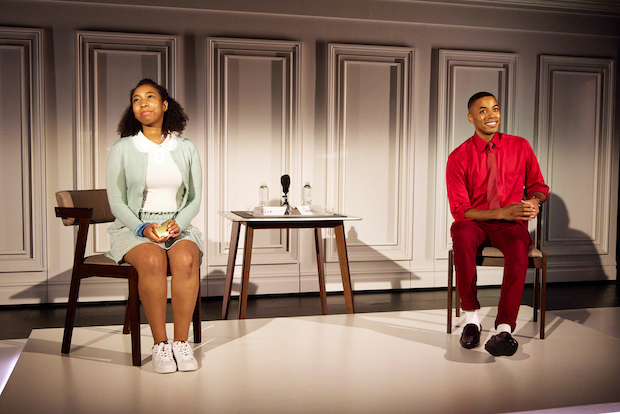Review: Patience in a Meritocracy That Demands Success Now
In Johnny G. Lloyd’s play, professional solitaire players represent the apex of the talent pyramid.

(© Jeremy Daniel)
The fear of loss is always more profound than the joy of obtaining something we want. “I feel like we have everything we need here,” says Jordan to his boyfriend Daniel as they move into a sprawling new house, “done everything right to like. To be good. To be really good.” Indeed, both are homeowners and professionally successful in their mid-20s (a large LSAT guide suggests that Jordan is a lawyer, while Daniel is a world-famous solitaire player). All things considered, they are doing exceedingly well for a generation that expects to be poorer than its parents.
And yet, Jordan (a tightly wound Jonathan Burke) fears the end of their relationship (and that the news will be delivered via personal assistant) and Daniel (Justiin Davis, cloaking terror in a furtive smile and cool suit) dreads the end of his career: He’s been on top for a while and as Cristal Conners sagely warned back in 1995, “There’s always someone younger and hungrier coming down the stairs after you.”
The fear of obsolescence in a meritocracy that only values the newest, fastest, most, and best is the anxiety powering Johnny G. Lloyd’s Patience, now making its world premiere with Second Stage Uptown. The play takes its title from an older name for the solo card game, with solitaire playing the role of a real competitive sport ravenously covered by the international press. Daniel follows the footsteps of Michelle Kwan, Michael Phelps, and Simone Biles — avatars of a system that rewards excellence (until it doesn’t) — and faces down the awful possibility of being washed-up before 30.

(© Jeremy Daniel)
This eventuality becomes more urgent with the arrival of Ella (the sharply assertive Zainab Barry), a young solitaire prodigy hell-bent on besting Daniel in a high-stakes matchup. Like an elder cat meeting a new kitten, he hisses, “You will lose you will lose so badly you will — wish you had decided to go to college.” It is revealing that the prospect of following a life path that is still out-of-reach for roughly half of Americans seems to grievously trouble her.
Lloyd is at his best when examining the lives and motives of the people adjacent to the struggle between Daniel and Ella: Mary E. Hodges portrays an imposing momager, driving her son to greatness while eyeing an exit ramp for herself as the end of his road nears. As Nikita, a former player who now works as a teacher/referee/PR consultant, Nemuna Ceesay sturdily stands in for all those contestants of the meritocracy who abandoned their dreams for a supporting role: administrators and coaches and…critics. As she sets up the card table, she describes herself as, “The luckiest version of myself I can possibly imagine,” and we half believe her.
Director Zhailon Levingston injects the adrenaline of a sports drama into a script that simultaneously requires that level of tension and yet undermines it with shaggy passages of introspection. The all-white downstage of Lawrence E. Moten III’s set resembles an Apple store (where you can shop for the newest thing, never satisfied with the current model) and the swinging panels of the upstage wall recall a gameshow, where happiness or ruin might just be hiding behind door number two. Avery Reed costumes Daniel like a rock star, while lighting designer Adam Honoré and sound designer Christopher Darbassie create the atmosphere of the US Open within the intimate confines of the McGinn/Cazale Theater. The tight production convinces us that solitaire really could be a competitive sport in a world that has turned everything into a competition.

(© Jeremy Daniel)
Unfortunately, Lloyd abandons his conceit late in the play in favor of two lengthy monologues about the subject he really wants to discuss: Venus and Serena Williams. This includes a tortured metaphor about Venus the planet always coming second to “younger, hotter” Mercury. Perhaps interesting as an essay in The New Yorker, this poetic thesis saps the play of all momentum right as it approaches the finish line. And then we do it again with Ella. Dramatically, it’s deadly.
Still, Lloyd deserves credit for dipping his audience into the simmering discontent of the meritocrats — Millennials and Gen-Zers who have done everything right and still don’t feel particularly happy, fulfilled, or even secure. The identity traits of the characters in this play (Black, gay, female) serve as red herrings in explaining a conflict that is rapidly coming to a head. The culture wars of the future will not revolve around identity, but will pit those who continue to lay their cards down in the meritocratic game against those who want to flip the table over in disgust.









